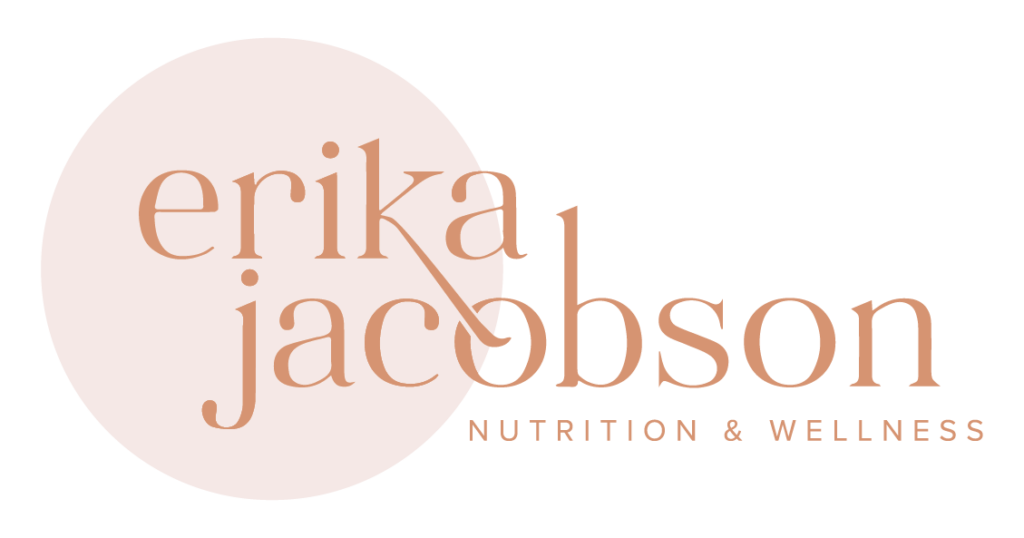Are you dealing with acid reflux? As a functional dietitian specializing in gut health, I often see clients struggling with acid reflux and GERD. If you’ve visited your doctor only to be offered acid-reducing medications and seek alternative ways to manage reflux, you’ve come to the right place.
In this blog post, we’ll explore effective strategies for addressing acid reflux from a functional nutrition perspective. But first, let’s delve into understanding what reflux is.
What Is Acid Reflux?
Reflux is a common condition in which stomach contents flow back into the esophagus, causing discomfort and a burning sensation commonly called heartburn. GERD is chronic acid reflux that occurs frequently and can eventually lead to damage and irritation of the esophageal lining.
Symptoms of Acid Reflux
- Sour taste in the mouth
- Regurgitation of undigested food
- Heartburn
- Burping and difficulty swallowing
Conventional Treatment of Acid Reflux
Conventional remedies for reflux typically focus on reducing stomach acid levels, utilizing antacids, H2 blockers, and proton pump inhibitors. While intended for short-term use, many individuals find themselves reliant on these medications long-term. Prolonged consumption of acid-reducing drugs can lead to deficiencies in essential nutrients like calcium, iron, zinc, and B12. Furthermore, it raises the likelihood of bacterial overgrowth and dysbiosis. While there are cases where prolonged consumption of these medications is necessary, they are frequently overprescribed and used longer than needed. It is crucial to consult your healthcare provider before adjusting your medication regimen.
The Importance of Stomach Acid
Stomach acid plays several crucial roles, such as stimulating the release of digestive enzymes and bile for proper breakdown and absorption of food, protecting against harmful bacteria and parasites, and preventing bacterial overgrowth in the small intestine. Despite being on acid-reducing medications, many individuals still suffer from reflux symptoms because the root cause of their reflux likely does not stem from an excess of stomach acid.
What Causes Acid Reflux?
Reflux is commonly misunderstood as stemming from excess stomach acid but is more often linked to inadequate production. The lower esophageal sphincter (LES) is supposed to prevent gastric juices from flowing back up. However, in cases of reflux, the LES doesn’t close properly.
Various factors can contribute to reflux, including:
- Eating habits
- Being overweight
- Poor digestion
- Food intolerances
- Lifestyle factors like smoking
- Stress
- Altered stomach acid
- Delayed gastric emptying and slow motility
- H. pylori
- Dysbiosis
- Anatomical issues like hiatal hernias
Lifestyle Strategies for Managing Acid Reflux
- Avoid eating close to bedtime and avoid lying down after meals
- Elevate the head of your bed while sleeping
- Prevent prolonged gaps between meals
- Choose loose-fitting clothing to alleviate stomach pressure
- Take a post-meal walk to enhance gut motility
- Practice mindful eating, ensuring thorough chewing until food reaches an applesauce-like consistency
- Quit smoking and limit alcohol intake
- Implement stress reduction techniques such as meditation, yoga, and breathwork
Nutrition Strategies for Managing Acid Reflux
- Strategies to boost stomach acid production can relieve reflux related to low stomach acid.
- Incorporate bitter foods such as arugula, endive, grapefruit, and ginger into your diet.
- Try diluted apple cider vinegar (start with ½ tsp diluted in 4 oz of water and increase as tolerated to 1 tbsp) or digestive bitters before meals.
- Minimize intake of heavily processed foods.
- Emphasize whole foods and an anti-inflammatory diet.
- Foods that may weaken the lower esophageal sphincter (LES) include:
- Fried and greasy foods
- Chocolate
- Coffee
- Spearmint and peppermint
- Sugar
- Alcohol
- Onion
- Garlic
- Foods that may irritate the esophageal lining:
- Citrus fruits and juices
- Tomatoes and tomato sauces
- Spicy foods
- Coffee
- Carbonated beverages
- It’s important to pay attention to how specific foods affect you; avoiding all reflux triggers may not be necessary. Keeping a food journal and collaborating with a dietitian can help to tailor your nutrition plan.
Supplement Support for Managing Acid Reflux
- Digestive bitters help to support digestion by triggering the release of enzymes, stomach acid, and bile. Try JUJ – use code EJNW10 for 10% off.
- Deglycyrrhizinated licorice (DGL) and slippery elm help to alleviate symptoms, lower inflammation and encourage repair. These can also be helpful when transitioning off proton pump inhibitors.
- Curcumin: A recent study showed curcumin supplementation can be as helpful as proton pump inhibitors for symptoms of functional dyspepsia.
- Zinc Carnosine: helps repair damage to the esophageal lining.
- Melatonin supplementation can improve LES function, preventing reflux.
- Ginger: Provides relief by accelerating gastric emptying.
- Unripe plantain powder can alleviate irritation and enhance mucus production for gut lining protection.
- Alginates can protect against acid reaching the esophagus.
- Remember, it’s always best to consult your healthcare professional before starting new supplements.
Alternative Therapies to Consider:
- Acupuncture
- Chiropractic care
- Visceral work if reflux/GERD from a hiatal hernia
How Can I Uncover The Root Cause of My Reflux Symptoms?
Functional gut testing can offer valuable insights if nutrition and lifestyle modifications have not alleviated your reflux. It can reveal underlying issues such as poor digestion, insufficient stomach acid, an imbalance in gut microbiota (dysbiosis), and the presence of H. Pylori bacteria, which are all potential root causes of reflux.
Closing Thoughts
Addressing reflux with functional nutrition interventions revolves around understanding the root causes and tailoring your diet and supplements to support overall digestive health. If you need more personalized support to tackling digestive issues like reflux, book a root cause clarity call here!




